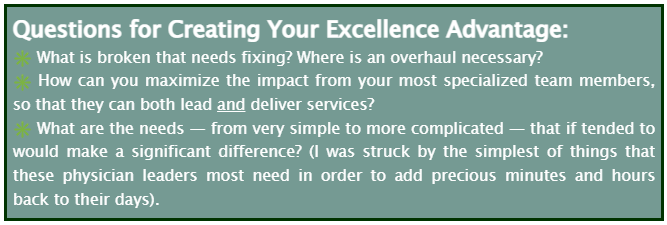When Minutes Count
I’ve been working recently with a group of physician leaders on ways to build an environment of high performance — both for the teams they lead and the larger organization they are a part of. I’d like to share a few observations.
NOTE: For those of you who work in industries outside of health and human services, you may find that these same observations may apply to those in highly specialized roles in your organization.
Most people recognize that physicians are central to the delivery of care. Their extensive education and training equip them with specialized diagnostic and treatment expertise that patients and other members of the care team depend on.
Retirements of baby boomer physicians and the pandemic have exacerbated a physician and clinician shortage. A recent article reported over 117,000 left their role in 2021 alone. These shortages will not be alleviated anytime soon.
DUAL ROLES
The physicians that I have been working with run the full continuum from express care and emergency medicine to primary care, specialists, and tertiary roles. Each are practicing physicians and part-time leaders. This dual role is something they feel is critical to their continued credibility with their clinician colleagues. However, this dual role, especially amidst a sustained workforce shortage, must be carefully crafted and bolstered by supportive resources.
We as leaders are well-served to put in place mechanisms to support these highly specialized members of the health system. They are very willing to contribute in these dual roles in areas where their specialized insights, knowledge, and perspectives will contribute most to the high performance of the system. However, they must be able to fully rely on members of their teams to effectively carry out administrative, operational, and clinical support roles in a high quality manner.
PROBLEM SOLVING
In a recent problem-solving session with this group of physician leaders, I was struck by the lack of even basic supportive structures to support their part-time leadership roles. For example, a surgeon who is also a leader, only recently began receiving administrative support for expense reports, booking meetings, and other administrative items that an administrative assistant can capably (and often enthusiastically) handle. Conversely, another physician leader, in a similar role as the first, shared how effectively and professionally his administrative support person handles a wide range of logistical and administrative functions from proofreading memos to drafting presentations to all arrangements for group meetings and more. It was remarkable the stark difference in levels of support provided to amplify the impact of these increasingly scarce and highly specialized clinicians within the same organization. Their time and skill are scarce resources.

Many of these physician leaders demonstrate relentless drive to “do it all” in the face of exhaustion. Many are picking up coverage and extra shifts for their colleagues; supporting their teammates by stepping up during vacancies.
They will frequently drop everything for an emergent patient crisis situation. But when crises become the norm, and are instead an everyday occurrence, we have to re-examine the systems. We have to question whether these are crises or rather a part of the care system even if we cannot predict them with precision.
As Paul Batalden, MD so eloquently said, “Every system is perfectly designed to get the results it gets.”
When our systems have broken, we cannot simply hope… We must improve, fix, and repair. A band-aid will not stop a gushing wound.
SOLUTIONS
Our physician leaders have solutions to offer — both simple and more complex. We would be well-served as executives, clinical, and operational leaders to partner with these valuable members of the team to uncover how to create effective and supportive structures, processes, and teams — with and around our physician leaders — to enable them to expertly contribute in both clinical and leadership capacities.
This dual role is essential to the betterment of our overall healthcare systems.
I am reminded once again why I have spent so much of my career in health and human services. Their unrelenting drive for the highest quality patient care, their willingness to serve fellow human beings in their most dire and vulnerable moments, and the pursuit of new and better ways of doing things — these, among many, are why I love to serve those who serve.
https://www.letendreassociates.com/2022/10/26/when-minutes-count/(opens in a new tab)

If you’d like to receive these Inspirations in your inbox every other week, you can subscribe to Kathy’s Excellence Advantage Inspirations Newsletter.
Kathy Letendre, President and Founder of Letendre & Associates, advises organizations and leaders to create their excellence advantage.
Contact Kathy by phone or text at 802-779-4315 or via email.

